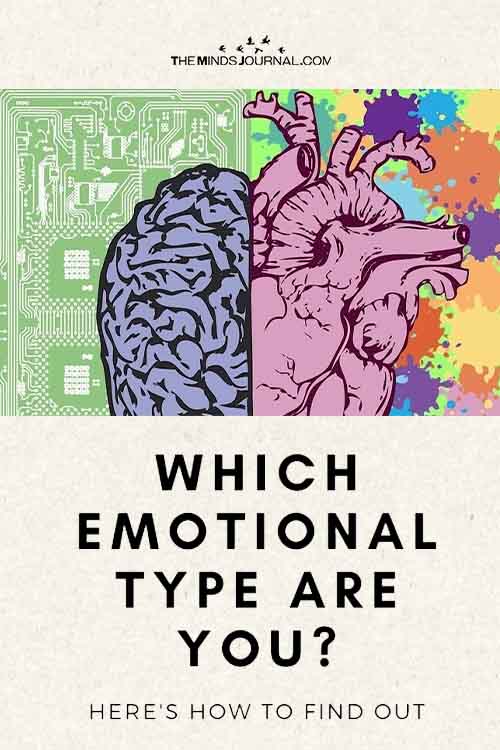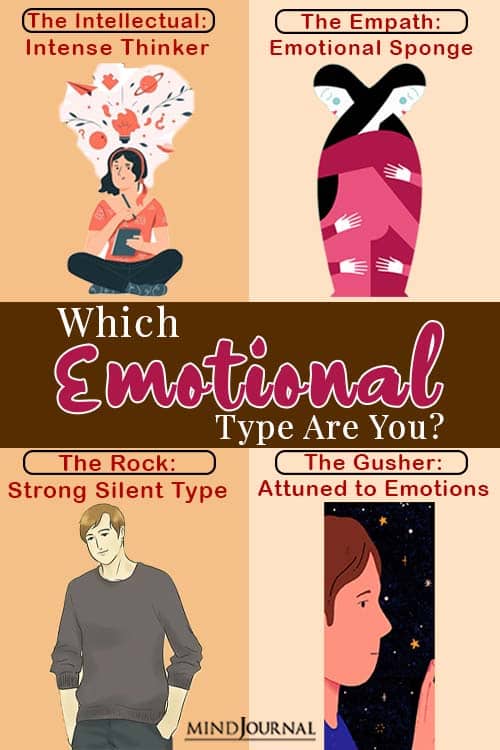Studies show that our choices, actions, and perceptions are all influenced by the emotions we are experiencing at any given moment. There are different types of emotions and different types of emotional beings, it’s important to understand different emotional types to learn effective ways of regulating your emotions and actions.
To pin down your style of how you relate emotionally, it’s important to know your emotional type. This is the filter through which you see the world, the default setting of your personality that you revert to, especially during stress. It represents your basic tendencies. You can build on these by making the most of your best traits and adopting traits from the other types that appeal to you.
In my book, “Emotional Freedom” I discuss four main emotional types that I’ve observed in my psychiatric practice. See which one you identify with the most, though you may also identify with aspects of the others.
Knowing your emotional type can provide insight into how you interact with others and also will help you master your emotions instead of simply reacting when your buttons get pushed.
Dealing with emotions effectively isn’t stuffing them away or feeling them less. It’s about establishing balance, strengthening those areas where you’re most vulnerable, and maximizing your assets.
Which Emotional Type Are You?
Type 1. The Intellectual: Intense Thinker

Intellectuals are bright articulate, incisive analysts who are most comfortable in the mind. The world is powerfully filtered through rational thought. Known for keeping their cool in heated situations, they often struggle with emotions, don’t trust their guts, are slow to engage in anything light-hearted, sensual, or playful.
Are you an intellectual?
Do you believe that you can think your way to any solution? When presented with a problem, do you immediately start analyzing the pros and cons rather than noticing how it makes you feel? Do you prefer planning to be spontaneous? Does your overactive mind prevent you from falling asleep?
Read Five Ways To Grow Up Intellectually
If so, try this:
1. Breathe. If you’re mentally gridlocked simply inhale and exhale deeply, in through your nose out through your mouth.
2. Exercise. Whether you’re walking, rollerblading, or lifting weights, exercise creates an acute body awareness that relaxes a busy mind.
3. Empathize. Ask yourself, “How can I respond from my heart, not just my head.” Empathize before trying to fix a problem with loved ones too quickly.
Type 2. The Empath: Emotional Sponge
Empaths are highly sensitive, loving, and supportive. People with this emotional type are finely tuned instruments when it comes to emotions and tends to feel everything, sometimes to an extreme.
Are you an empath?
Have you been called “too emotional” or “overly sensitive”? If a friend is upset do you start feeling it too? Do you replenish your energy by being alone and tend to get exhausted in crowds? Are you sensitive to noise, smells, and excessive talking?
Read Layers of The Empath Gift: 10 Levels of Empath Evolution
If so, try this:
1. Take calming mini-breaks throughout the day. Go outside for a walk, meditate in your room alone. Focus on exhaling pent-up emotions such as anxiety or fear so they don’t lodge in your body.
2. Protect your sensitivities. Make a list of your top five most emotionally rattling situations, then formulate a plan for handling them so you don’t get caught in a panic. For instance, take your own car places so you don’t get trapped in social situations. (For more strategies see my previous blog “Are You an Empath?”)
Type 3. The Rock: Strong And Silent Type
Consistent, dependable, and stable they will always show up for you. You can express emotions freely around them—they won’t get upset or judge. But, people with this emotional type often have a hard time expressing their own feelings, and their mates are always trying to get them to express emotions.
Are you a rock?
Is it easier for you to listen than to share your feelings? Do you often feel like you are the most dependable person in the room? Are you generally satisfied with the status quo in relationships (though others try to draw you out emotionally)?
If so, try this:
1. Stir things up. Begin to initiate emotional exchanges instead of simply responding to them. Remember that showing emotions is a form of passion and generosity too.
2. Express a feeling a day. In a daily journal, write down an emotion you’re experiencing. Don’t hold back. Are you pissed off? Content? In love? Whatever you feel, bravo! Tell someone. Express the emotion.
Type 4. The Gusher: Attuned To Emotions
Gushers are in touch with their emotions and love to share them. No one has to wonder where they’re at. Gushers are able to quickly process negativity and move on. Their downside is that they tend to share “too much information” and over-sharing can burn people out.
Are you a gusher?
Do you get anxious if you keep your feelings in? When a problem arises is your first impulse to pick up the phone and share? Do you have trouble sensing other people’s emotional boundaries?
If so, try this:
Before seeking support, tune into your intuition. Spend a few quiet moments going inward to find out what your gut says. Try to solve the situation from a calm centered place. See what flashes or “ah-has” come to you. Take time to build your own emotional muscles.
The most important relationship you’ll ever have is with yourself. If this is good, you’ll be able to have wonderful relationships with others. Knowing your emotional type provides a platform to emotionally evolve and to become a truly powerful person.
So, which emotional type are you? Leave a comment below.
Written by Dr. Judith Orloff
Originally appeared in Judith Orloff M.D.











Leave a Reply